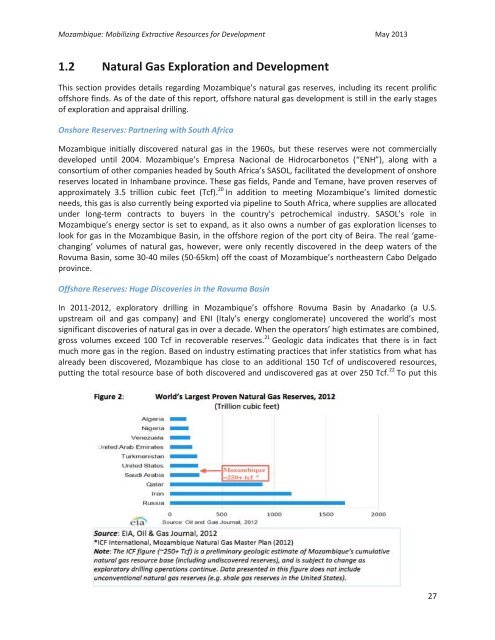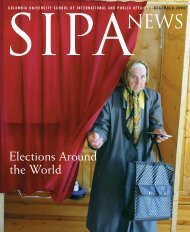- Page 1: Mozambique: Mobilizing Extractive R
- Page 5 and 6: Contents Table of Contents Acknowle
- Page 7 and 8: Mozambique: Mobilizing Extractive R
- Page 9 and 10: Mozambique: Mobilizing Extractive R
- Page 11 and 12: Mozambique: Mobilizing Extractive R
- Page 13 and 14: Mozambique: Mobilizing Extractive R
- Page 15 and 16: Mozambique: Mobilizing Extractive R
- Page 17: Mozambique: Mobilizing Extractive R
- Page 20 and 21: Mozambique: Mobilizing Extractive R
- Page 22 and 23: Mozambique: Mobilizing Extractive R
- Page 24 and 25: Mozambique: Mobilizing Extractive R
- Page 28 and 29: Mozambique: Mobilizing Extractive R
- Page 30 and 31: Mozambique: Mobilizing Extractive R
- Page 32 and 33: Mozambique: Mobilizing Extractive R
- Page 34 and 35: Mozambique: Mobilizing Extractive R
- Page 36 and 37: Mozambique: Mobilizing Extractive R
- Page 38 and 39: Mozambique: Mobilizing Extractive R
- Page 40 and 41: Mozambique: Mobilizing Extractive R
- Page 42 and 43: Mozambique: Mobilizing Extractive R
- Page 44 and 45: Mozambique: Mobilizing Extractive R
- Page 46 and 47: Mozambique: Mobilizing Extractive R
- Page 48 and 49: Mozambique: Mobilizing Extractive R
- Page 50 and 51: Mozambique: Mobilizing Extractive R
- Page 52 and 53: Mozambique: Mobilizing Extractive R
- Page 54 and 55: Mozambique: Mobilizing Extractive R
- Page 56 and 57: Mozambique: Mobilizing Extractive R
- Page 58 and 59: Mozambique: Mobilizing Extractive R
- Page 60 and 61: Mozambique: Mobilizing Extractive R
- Page 62 and 63: Mozambique: Mobilizing Extractive R
- Page 64 and 65: Mozambique: Mobilizing Extractive R
- Page 66 and 67: Mozambique: Mobilizing Extractive R
- Page 68 and 69: Mozambique: Mobilizing Extractive R
- Page 70 and 71: Mozambique: Mobilizing Extractive R
- Page 72 and 73: Mozambique: Mobilizing Extractive R
- Page 74 and 75: Mozambique: Mobilizing Extractive R
- Page 76 and 77:
Mozambique: Mobilizing Extractive R
- Page 78 and 79:
Mozambique: Mobilizing Extractive R
- Page 80 and 81:
Mozambique: Mobilizing Extractive R
- Page 82 and 83:
Mozambique: Mobilizing Extractive R
- Page 84 and 85:
Mozambique: Mobilizing Extractive R
- Page 86 and 87:
Mozambique: Mobilizing Extractive R
- Page 88 and 89:
Mozambique: Mobilizing Extractive R
- Page 90 and 91:
Mozambique: Mobilizing Extractive R
- Page 92 and 93:
Mozambique: Mobilizing Extractive R
- Page 94 and 95:
Mozambique: Mobilizing Extractive R
- Page 96 and 97:
Mozambique: Mobilizing Extractive R
- Page 98 and 99:
Mozambique: Mobilizing Extractive R
- Page 100 and 101:
Mozambique: Mobilizing Extractive R
- Page 102 and 103:
Mozambique: Mobilizing Extractive R
- Page 104 and 105:
Mozambique: Mobilizing Extractive R
- Page 106 and 107:
Mozambique: Mobilizing Extractive R
- Page 108 and 109:
Mozambique: Mobilizing Extractive R
- Page 110 and 111:
Mozambique: Mobilizing Extractive R
- Page 112 and 113:
Mozambique: Mobilizing Extractive R
- Page 114 and 115:
Mozambique: Mobilizing Extractive R
- Page 116 and 117:
Mozambique: Mobilizing Extractive R
- Page 118 and 119:
Mozambique: Mobilizing Extractive R
- Page 120 and 121:
Mozambique: Mobilizing Extractive R
- Page 123 and 124:
Mozambique: Mobilizing Extractive R
- Page 125 and 126:
Mozambique: Mobilizing Extractive R
- Page 127 and 128:
Mozambique: Mobilizing Extractive R
- Page 129 and 130:
Mozambique: Mobilizing Extractive R
- Page 131 and 132:
Mozambique: Mobilizing Extractive R
- Page 133 and 134:
Mozambique: Mobilizing Extractive R
- Page 135 and 136:
Mozambique: Mobilizing Extractive R
- Page 137 and 138:
Mozambique: Mobilizing Extractive R
- Page 139:
Mozambique: Mobilizing Extractive R
- Page 142 and 143:
Mozambique: Mobilizing Extractive R
- Page 144 and 145:
Mozambique: Mobilizing Extractive R
- Page 146 and 147:
Mozambique: Mobilizing Extractive R
- Page 148 and 149:
Mozambique: Mobilizing Extractive R
- Page 150 and 151:
Mozambique: Mobilizing Extractive R
- Page 152 and 153:
Mozambique: Mobilizing Extractive R
- Page 154 and 155:
Mozambique: Mobilizing Extractive R
- Page 156 and 157:
Mozambique: Extractives for Prosper
- Page 158 and 159:
Mozambique: Extractives for Prosper
- Page 160 and 161:
Mozambique: Extractives for Prosper
- Page 162 and 163:
Mozambique: Extractives for Prosper
- Page 164 and 165:
Mozambique: Extractives for Prosper
- Page 166 and 167:
Mozambique: Extractives for Prosper
- Page 168 and 169:
Mozambique: Extractives for Prosper
- Page 170 and 171:
Mozambique: Extractives for Prosper
- Page 172 and 173:
Mozambique: Extractives for Prosper
- Page 174 and 175:
Mozambique: Extractives for Prosper
- Page 176 and 177:
Mozambique: Extractives for Prosper
- Page 178 and 179:
Mozambique: Extractives for Prosper
- Page 180 and 181:
Mozambique: Extractives for Prosper
- Page 182 and 183:
Mozambique: Extractives for Prosper
- Page 184 and 185:
Mozambique: Extractives for Prosper
- Page 186 and 187:
Mozambique: Extractives for Prosper
- Page 188 and 189:
Mozambique: Extractives for Prosper
- Page 190 and 191:
Mozambique: Extractives for Prosper
- Page 192 and 193:
Mozambique: Extractives for Prosper
- Page 194 and 195:
Mozambique: Extractives for Prosper
- Page 196 and 197:
Mozambique: Extractives for Prosper
- Page 198 and 199:
Mozambique: Extractives for Prosper
- Page 200 and 201:
Mozambique: Extractives for Prosper
- Page 202 and 203:
Mozambique: Extractives for Prosper
- Page 204 and 205:
Mozambique: Extractives for Prosper
- Page 206 and 207:
Mozambique: Extractives for Prosper
- Page 208 and 209:
Mozambique: Extractives for Prosper
- Page 210 and 211:
Mozambique: Extractives for Prosper
- Page 212 and 213:
Mozambique: Extractives for Prosper
- Page 214 and 215:
Mozambique: Extractives for Prosper
- Page 216 and 217:
Mozambique: Extractives for Prosper
- Page 218 and 219:
Mozambique: Extractives for Prosper
- Page 220 and 221:
Mozambique: Extractives for Prosper
- Page 222 and 223:
Mozambique: Extractives for Prosper
- Page 224 and 225:
Mozambique: Extractives for Prosper
- Page 226 and 227:
Mozambique: Extractives for Prosper
- Page 228 and 229:
Mozambique: Extractives for Prosper
- Page 230 and 231:
Mozambique: Extractives for Prosper
- Page 232 and 233:
Mozambique: Extractives for Prosper
- Page 234 and 235:
Mozambique: Extractives for Prosper
- Page 236 and 237:
Mozambique: Extractives for Prosper
- Page 238 and 239:
Mozambique: Extractives for Prosper
- Page 240 and 241:
Mozambique: Extractives for Prosper
- Page 242 and 243:
Mozambique: Extractives for Prosper
- Page 244 and 245:
Mozambique: Extractives for Prosper
- Page 246 and 247:
Mozambique: Extractives for Prosper
- Page 248 and 249:
Mozambique: Extractives for Prosper
- Page 250 and 251:
Mozambique: Extractives for Prosper
- Page 252 and 253:
Mozambique: Extractives for Prosper
- Page 254 and 255:
Mozambique: Extractives for Prosper
- Page 256 and 257:
Mozambique: Extractives for Prosper
- Page 258 and 259:
Mozambique: Extractives for Prosper
- Page 260 and 261:
Mozambique: Extractives for Prosper
- Page 262 and 263:
Mozambique: Extractives for Prosper
- Page 264 and 265:
Mozambique: Extractives for Prosper
- Page 266 and 267:
Mozambique: Extractives for Prosper
- Page 268 and 269:
Mozambique: Extractives for Prosper
- Page 270 and 271:
Mozambique: Extractives for Prosper
- Page 272 and 273:
Mozambique: Extractives for Prosper
- Page 274 and 275:
Mozambique: Extractives for Prosper
- Page 276 and 277:
Mozambique: Extractives for Prosper
- Page 278 and 279:
Mozambique: Extractives for Prosper
- Page 280 and 281:
Mozambique: Extractives for Prosper
- Page 282 and 283:
Mozambique: Extractives for Prosper
- Page 284 and 285:
Mozambique: Extractives for Prosper
- Page 286 and 287:
Mozambique: Extractives for Prosper
- Page 288 and 289:
Mozambique: Extractives for Prosper
- Page 290 and 291:
Mozambique: Extractives for Prosper
- Page 292 and 293:
Mozambique: Extractives for Prosper
- Page 294 and 295:
Mozambique Capstone Appendix 3A: Ec
- Page 296 and 297:
Mozambique Capstone Appendix 3B: So
- Page 298 and 299:
Mozambique Capstone Appendix 3B: So
- Page 300 and 301:
Mozambique Capstone Appendix 3B: So
- Page 302 and 303:
Mozambique Capstone Appendix 3B: So
- Page 304 and 305:
Mozambique Capstone Appendix 3C: Tr
- Page 306 and 307:
Mozambique Capstone Appendix 3C: Ib
- Page 308 and 309:
Mozambique Capstone Appendix 3D: Wo
- Page 310 and 311:
Mozambique Capstone Appendix 3D: IF
- Page 312 and 313:
Mozambique Capstone Appendix 3D: IF
- Page 314 and 315:
Mozambique Capstone Trading Across
- Page 316 and 317:
Mozambique Capstone Appendix 3E: Na
- Page 318 and 319:
Mozambique Capstone Appendix 3E: Re
- Page 320 and 321:
Mozambique Capstone Profiles of the
- Page 322:
Mozambique Capstone Mozambique Caps

















